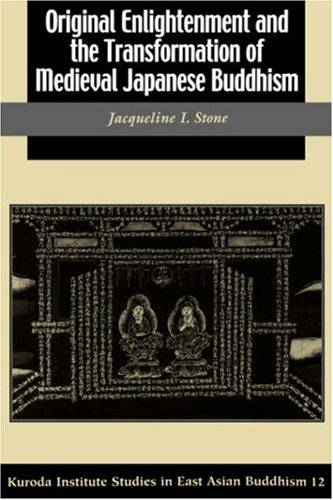Original Enlightenment and the Transformation of Medieval Japanese Buddhism
- About the Book
-
Original enlightenment thought (hongaku shiso) dominated Buddhist intellectual circles throughout Japan’s medieval period. Enlightenment, this discourse claims, is neither a goal to be achieved nor a potential to be realized but the true status of all things. Every animate and inanimate object manifests the primordially enlightened Buddha just as it is. Seen in its true aspect, every activity of daily life—eating, sleeping, even one’s deluded thinking—is the Buddha’s conduct. Emerging from within the powerful Tendai School, ideas of original enlightenment were appropriated by a number of Buddhist traditions and influenced nascent theories about the kami (local deities) as well as medieval aesthetics and the literary and performing arts.
Scholars and commentators have long recognized the historical importance of original enlightenment thought but differ heatedly over how it is to be understood. Some tout it as the pinnacle of the Buddhist philosophy of absolute non-dualism. Others claim to find in it the paradigmatic expression of a timeless Japanese spirituality. According other readings, it represents a dangerous anti-nomianism that undermined observance of moral precepts, precipitated a decline in Buddhist scholarship, and denied the need for religious discipline. Still others denounce it as an authoritarian ideology that, by sacralizing the given order, has in effect legitimized hierarchy and discriminative social practices. Often the acceptance or rejection of original enlightenment thought is seen as the fault line along which traditional Buddhist institutions are to be differentiated from the new Buddhist movements (Zen, Pure Land, and Nichiren) that arose during Japan’s medieval period.
Jacqueline Stone’s groundbreaking study moves beyond the treatment of the original enlightenment doctrine as abstract philosophy to explore its historical dimension. Drawing on a wealth of medieval primary sources and modern Japanese scholarship, it places this discourse in its ritual, institutional, and social contexts, illuminating its importance to the maintenance of traditions of lineage and the secret transmission of knowledge that characterized several medieval Japanese elite culture. It sheds new light on interpretive strategies employed in pre-modern Japanese Buddhist texts, an area that hitherto has received a little attention. Through these and other lines of investigation, Stone problematizes entrenched notions of “corruption” in the medieval Buddhist establishment. Using the examples of Tendai and Nichiren Buddhism and their interactions throughout the medieval period, she calls into question both overly facile distinctions between “old” and “new” Buddhism and the long-standing scholarly assumptions that have perpetuated them. This study marks a significant contribution to ongoing debates over definitions of Buddhism in the Kamakura era (1185–1333), long regarded as a formative period in Japanese religion and culture. Stone argues that “original enlightenment thought” represents a substantial rethinking of Buddhist enlightenment that cuts across the distinction between “old” and “new” institutions and was particularly characteristic of the medieval period.
- About the Author(s)
-
Jacqueline I. Stone, Author
Jacqueline I. Stone is professor of religion at Princeton University.
- Reviews and Endorsements
-
- A benchmark of scholarly excellence ... very thoroughly and coherently organized.... Stone’s work is also important because it both examines medieval sources and introduces us to the works of many contemporary Japanese scholars. Her summaries of their works open up an important world of research and study.
—H-Net Reviews - A careful reading and re-reading by this reviewer has only served to confirm the aptness of the superlatives lavished by the above colleagues, themselves pace-setting scholars of Japanese Buddhism.
—The Eastern Buddhist XXXII - A sophisticated and complex study
—Harvard Journal of Asiatic Studies - A brilliant presentation and analysis of an influential discourse in Japanese Buddhism, religion, and culture.... Everybody must get Stone.
—Japanese Journal of Religious Studies - Stone’s excellent treatment ... will become the new benchmark for all subsequent inquiries into this topic.
—Journal of Japanese Studies - One of very few seminal works on Japanese Buddhism.... Stone’s meticulous research and style brings a greater understanding of perhaps the most important period and movement in Japanese Buddhist history.
—Daily Yomiuri - This book brims over with stimulating discussions, sharp analyses, and a variety of interesting topics.
—IIAS Newsletter - Eine ausgezeichnete Grundlage
—NOAG - One of the most important academic books ever published on Japanese Buddhism. It should be standard reading for graduate students and scholars not only in Buddhism but in other fields of medieval Japanese studies.
—Carl Bielefeldt, Stanford University - This is an exciting, ambitious, and valuable piece of work, a major contribution to the field of Buddhist studies and to our understanding of Japanese culture in general. It will become an invaluable resource for Western students of Japanese culture.
—William Bodiford, University of California, Los Angeles - This book will become a classic, a seminal text that will encourage other studies in the fertile ground that Stone has so ably broken. It is one of the most important books on Japanese Buddhism ever written.
—Paul Groner, University of Virginia
- A benchmark of scholarly excellence ... very thoroughly and coherently organized.... Stone’s work is also important because it both examines medieval sources and introduces us to the works of many contemporary Japanese scholars. Her summaries of their works open up an important world of research and study.
- Supporting Resources
-





